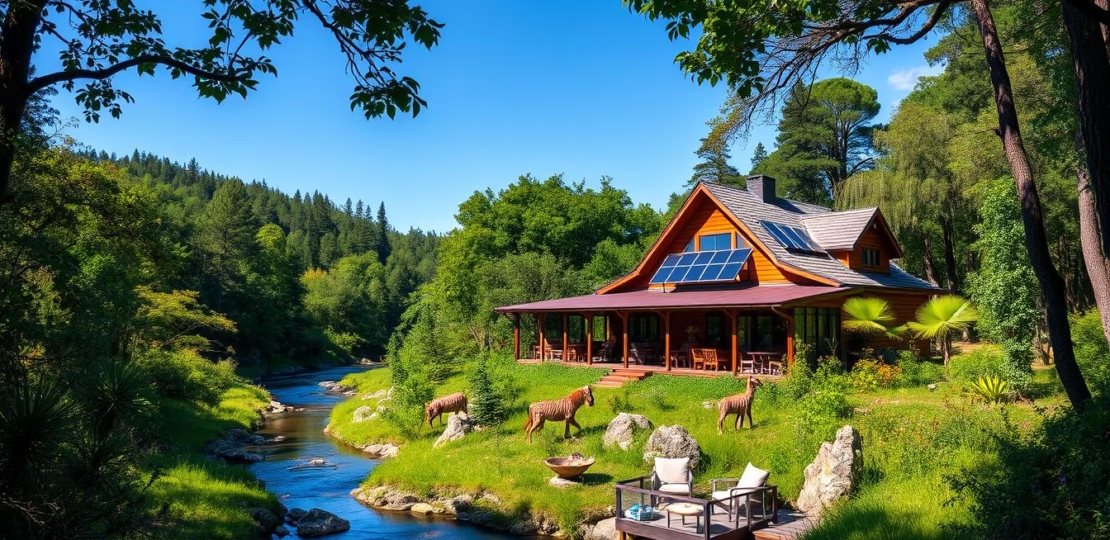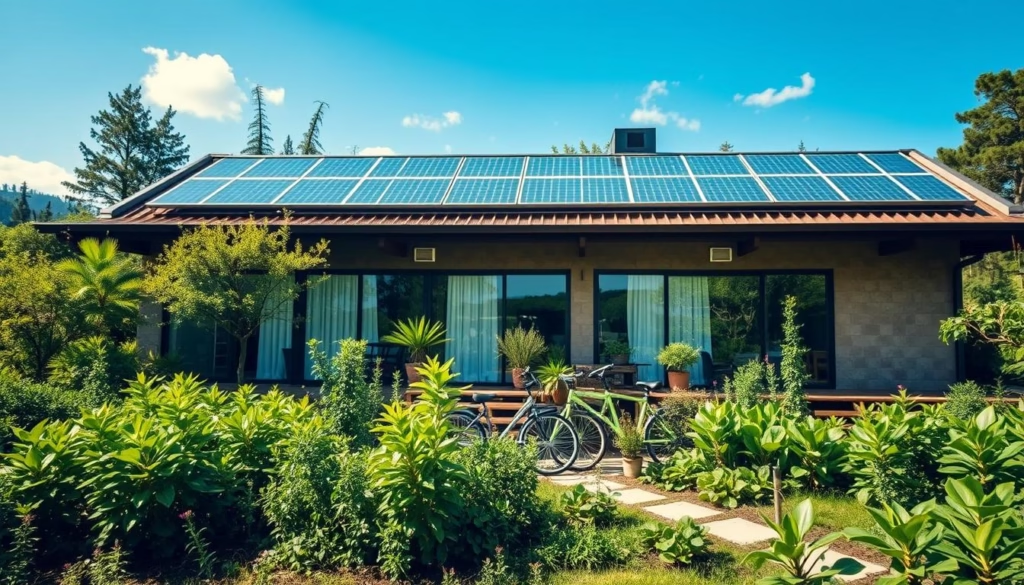Eco-Friendly Travel: How to Choose Sustainable Accommodations
November 23, 2024 | by m33559844@gmail.com

Imagine being in a bustling city, surrounded by sounds, smells, and sights. You know that your travel choices can affect the environment. This is what eco-friendly travel is all about—seeing the world while keeping it safe for others.
By picking green hotels, we cut down on pollution and connect with local cultures. Today, more than 60% of travelers look for eco-friendly places to stay1. This shows we all care about our planet.
This guide will show you how to travel green and choose hotels that are good for the Earth. We’ll explore how our choices can make travel better for everyone and help our planet.
Key Takeaways
- Eco-friendly travel prioritizes sustainability to reduce environmental impact.
- Choosing sustainable accommodations enhances travel experiences.
- Each traveler has the power to influence local economies positively.
- Small adjustments, like energy-saving practices, can lead to substantial environmental benefits.
- Understanding eco-labels helps in identifying true sustainable options.
If you’re ready to kickstart your travel journey with ease and exclusive savings, book your first trip now! Visit Trip.com using this special promotion link and register to reserve tickets, accommodation, and more. Don’t miss out on these incredible travel deals tailored for first-time travelers—start planning today!
Understanding Sustainable Accommodations
Sustainable travel is a growing movement that focuses on being kind to the environment. It aims to reduce harm to nature while helping local communities. Sustainable accommodations play a big role in this, as they help lower our impact on the planet and make travel better.
What Defines Sustainable Travel?
Sustainable travel is about more than just seeing sights. It’s about traveling in a way that helps preserve nature and culture. Green hotels and lodges often get special certifications to show they’re eco-friendly.
Choosing these places helps reduce waste and saves resources. It also keeps our oceans clean by avoiding single-use plastics. Sustainable travel planning means we try to leave the smallest footprint possible and help everyone equally2.
The Importance of Sustainable Accommodations
Sustainable accommodations are key to responsible tourism. They focus on saving resources, working with the community, and helping nature come back. These places don’t just host guests; they also support local businesses and artists.
By staying in these places, we help keep cultures alive and have a richer experience. They offer things like energy-saving lights and natural toiletries. This makes our travels more sustainable3.
Characteristics of Eco-Friendly Hotels
Eco-friendly hotels are changing the hospitality world. They focus on being green while still offering modern comforts. These places get eco-labels that show they care about the planet. This means travelers can be sure they’re staying somewhere that’s good for the environment.
Eco-Label and Certifications
Eco-labels are key to finding truly green hotels. They show hotels have been checked for things like energy use and waste. Programs like the GreenLeaders from TripAdvisor help hotels show they’re eco-friendly. So, when you’re picking a place to stay, look for these labels to know it’s green.
Green Practices to Look For
When checking out eco-friendly hotels, look for certain green practices. Some important ones include:
- Using solar panels and LED lights to cut down on carbon emissions4.
- Buying food, furniture, and decor locally to support local communities and reduce emissions45.
- Having smart room technologies like IoT-connected items for saving energy, and natural toiletries in biodegradable packaging5.
- Starting composting and waste reduction to help gardens grow and reduce landfill waste5.
By looking for these green practices, you can pick a hotel that’s good for you and the planet.

If you’re ready to kickstart your travel journey with ease and exclusive savings, book your first trip now! Visit Trip.com using this special promotion link and register to reserve tickets, accommodation, and more. Don’t miss out on these incredible travel deals tailored for first-time travelers—start planning today!
Types of Sustainable Accommodations
There are many options for those who want to travel sustainably. Knowing about different sustainable lodging can make your trip better. You can choose from eco-friendly hotels to cozy guesthouses, each meeting different needs.
Eco-Friendly Hotels and Green Hotels
Eco-friendly hotels use green practices and have sustainability certifications. They aim to cut down their carbon footprint by using energy-efficient systems and managing waste responsibly. Many have stopped giving out plastic water bottles to reduce waste.
Places like Berlin and Copenhagen offer many eco-friendly hotels. These hotels are perfect for travelers who care about the environment6.
Guesthouses and Bed & Breakfasts
Guesthouses and bed & breakfasts are run by locals, offering a unique charm. They provide personalized service and help the local economy. This makes your trip better and helps the community7.
Homestays: A Local Touch
Homestays let you experience local culture and lifestyle up close. Staying with a local family supports them financially and offers real experiences. It’s a great way to learn about the place and support local families6.

| Type of Accommodation | Benefits | Sustainability Focus |
|---|---|---|
| Eco-Friendly Hotels | Reduced environmental impact, modern amenities | Energy efficiency, waste management, local sourcing |
| Guesthouses | Local charm, personalized service | Community support, low carbon footprint |
| Homestays | Cultural immersion, community engagement | Support local families, promote local traditions |
How to Choose the Right Eco-Friendly Travel Accommodations
Finding the right eco-friendly place to stay needs careful research and checks. It’s important to know how to pick places that are good for the planet. Start by looking at online reviews that talk about green practices. Sites like TripAdvisor often have reviews that mention eco-friendly efforts.
Also, don’t forget to reach out to places directly to ask about their green policies. They might tell you about hiring local people, using local food, and saving energy. These actions help cut down on pollution and protect the environment89.
Researching and Verification Methods
When searching for places to stay, use keywords like “sustainable” to find good options. Look for places with green certifications, which show they care about the planet10. Also, think about using apps that help find eco-friendly places and track your carbon footprint. This way, you make better choices and enjoy your trip more while helping the planet109.
Evaluating Policies and Practices
When checking out places, look at their green policies and actions. See how they handle waste, energy, and water. If they’re good at saving resources, they’re serious about being green. It’s also good to choose places that support local culture and help the community. This makes your trip more meaningful and helps the local area89.

If you’re ready to kickstart your travel journey with ease and exclusive savings, book your first trip now! Visit Trip.com using this special promotion link and register to reserve tickets, accommodation, and more. Don’t miss out on these incredible travel deals tailored for first-time travelers—start planning today!
| Criteria | What to Look For |
|---|---|
| Certifications | Green certifications by organizations like Green Key, LEED, or EarthCheck |
| Local Employment | Preference for hiring local staff and using local products |
| Energy & Water Usage | Efficient systems in place for energy and water conservation |
| Waste Management | Recycling programs and waste reduction initiatives |
| Community Engagement | Programs designed to support local communities and cultures |
Avoiding Greenwashing in Hospitality
More people want to travel in an eco-friendly way. But, greenwashing is becoming a big problem. This means businesses might lie about being green. Hotels might say they’re eco-friendly but not really be.
To find the real deal, travelers need to learn how to spot true eco-friendly places.
Spotting Genuine Eco-Friendly Claims
Being clear about being green is key. Look closely at hotel websites for their green policies. Many hotels have eco-labels and certifications.
Look for trusted ones like EarthCheck or B Corp. These show a hotel really cares about the planet and people11.
Choosing Locally-Run Establishments
Choosing small, local places can be better for the planet. They often do more to help their community. About 60-70% of hotels are now trying to be greener12.
Local places also support jobs and fair treatment. Plus, eating local, organic food makes your trip greener.
| Indicators of Authentic Eco-Friendliness | Greenwashing Red Flags |
|---|---|
| Verified eco-certifications (e.g., EarthCheck, LEED) | Vague sustainability claims without evidence |
| Transparent sustainability policies on websites | Lack of information on energy & water efficiency |
| Investment in local communities and sustainable practices | Excessive single-use plastic products |
| Positive socio-economic impact and inclusivity | Token eco initiatives without real impact |
Sustainable Travel Tips for Eco-Conscious Travelers
Eco-conscious travelers can make a big difference by supporting local economies and choosing minimalism. By picking local businesses, travelers help the communities they visit. This enriches cultural experiences and boosts local economies.
This approach also reduces carbon emissions. Locally-sourced items have less impact on the environment than imported goods13.
Prioritizing Local Economies
Choosing local accommodations, restaurants, and activities makes travel better. Small businesses often use local and seasonal products. This supports sustainability for both the environment and local communities14.
Supporting these businesses helps the local economy grow. It creates jobs and improves people’s lives in the area.
Embracing Minimalism in Travel Choices
Traveling lightly reduces waste and promotes sustainability. Lighter luggage means less fuel and lower carbon emissions14. Eco-conscious travelers should use reusable items like water bottles and cutlery to avoid single-use plastics.
Even small changes, like adjusting hotel thermostats by 2 degrees, can save a lot of energy13. These choices help protect local environments and cultures.
Best Eco-Friendly Hotels Around the World
Travelers looking for the best eco-friendly hotels find a wide range of options. These unique green hotels offer a comfortable stay and support the environment. They use renewable energy and focus on local sourcing and conservation.
Top Picks in Different Regions
- Sani Resort in Greece is the first carbon-neutral resort, powered by renewable energy15.
- Forestis Dolomites in Italy is fully carbon-neutral, located at 5,905 feet above sea level1516.
- 1 Hotel Mayfair in England saved 4,200 tonnes of carbon by keeping over 80% of its structure15.
- Fogo Island Inn in Canada offers a 62-suite sanctuary and reinvests profits in the local community1516.
- The Brando in French Polynesia is the first resort to achieve LEED Platinum certification15.
Unique Green Hotels to Experience
- Wolwedans in Namibia works in the NamibRand nature reserve, focusing on land conservation and supporting local businesses15.
- Åmot in Norway offers locally sourced meals and promotes Norwegian culture through activities15.
- Hidden Hotel in Paris has Green Globe certification, showing its commitment to sustainability16.
- Heckfield Place in England is the first luxury hotel to achieve biodynamic status, showing a new way to sustainable hospitality16.
- Jicaro Private Island in Nicaragua uses solar energy, offering an eco-friendly experience16.
Eco-Friendly Travel: Embracing Change for the Future
Looking ahead, the role of individual actions in eco-friendly travel is key. Those who promote sustainability are crucial for a greener travel world. By making small changes, like using public transport or choosing eco-hotels, we can help a lot.
The Role of Travelers in Promoting Sustainability
The aviation sector is a big source of CO2 emissions, about 2-3% of global emissions17. Choosing public transport over cars can cut emissions by up to 60%18. Staying in eco-hotels also helps, using 40% less water18.
How Small Changes Can Make a Big Impact
Even small changes in travel habits can make a big difference. Sustainable travel can cut a destination’s carbon footprint by up to 50%18. For example, carrying lighter luggage can reduce emissions by 2% per passenger17. These small steps can add up to a big change for a sustainable travel future.
Conclusion
Eco-friendly travel is easy and rewarding for those who want to help the planet. More people are choosing to travel in a way that’s good for the environment. This is because many places now offer green accommodations and activities that are both fun and eco-friendly.
Hotels that care about the environment are especially valued. They work hard to save water, reduce pollution, and cut down on waste19. This shows that they are serious about being green.
Traveling in a sustainable way also has many benefits. It helps protect nature and creates jobs. Plus, it boosts local economies19. This is good for both the places we visit and the people who live there.
So, when we travel, it’s important to choose eco-friendly options. This includes staying in green hotels and using public transport20. Doing this helps reduce our impact on the environment.
Backpacking in South America: The Ultimate Guide for Adventurers . By making these choices, we can make a big difference. We can help keep the places we love beautiful for others to enjoy in the future19. Together, we can make travel better for both people and the planet.
FAQ : Eco-friendly travel
What is eco-friendly travel?
Eco-friendly travel means trying to not harm the environment and local cultures when you travel. It’s about making smart choices to lessen your impact on the planet.
Why are sustainable accommodations important?
Sustainable places to stay are key because they help protect the environment and support local communities. They offer a chance to really connect with local cultures and reduce waste.
How can I identify eco-friendly hotels?
Look for hotels with eco-labels from trusted groups. Also, check if they use safe cleaning products, renewable energy, and local food. See if they recycle too.
What types of sustainable accommodations are available?
You can choose from eco-hotels, guesthouses, bed & breakfasts, and homestays. Each has its own special benefits, fitting different travel styles and supporting green tourism.
How can I ensure a hotel is genuinely eco-friendly?
Do your homework by reading reviews and checking if they’re open about their green efforts. Look for signs they really care, like hiring locals and using local food.
What is greenwashing, and how can I avoid it?
Greenwashing is when companies pretend to be green but aren’t. To avoid it, question their claims, look for real eco-certifications, and choose places run by locals over big hotels.
What are some tips for sustainable travel?
Choose places and activities that support local economies and reduce waste. Use items you can reuse, like water bottles and bags. These small steps make a big difference.
Where can I find the best eco-friendly hotels?
Search online for top eco-hotels in different places. They show off green practices and offer unique experiences that help local communities.
How can I contribute to sustainable tourism as a traveler?
By picking the right places to stay and activities, and by being eco-friendly, you can help lessen your impact. Every choice you make can support green tourism.
RELATED POSTS
View all



